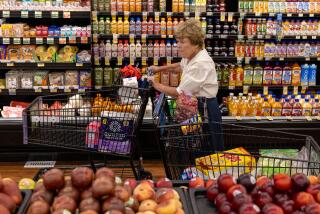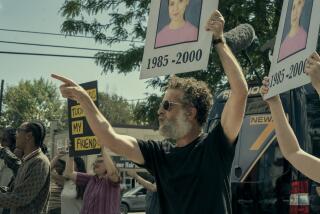Learning to Swallow the Bitter Pill of Dependency
- Share via
It is taking me forever to navigate the wide expanse of graveled lot between my parking space and the skating rink. My 9-year-old daughter runs up ahead . . . so far ahead I lose sight of her in the mass of little girls.
I’m escorting her to an ice skating party with her Brownie troop. But she is embarrassed to be seen with a mother on crutches.
She tells me this--by way of apology and request--as we park the car. Can her big sister walk her in instead?
It stings, I admit, to be disavowed by your flesh and blood. But I understand. And I know how she feels.
I’m embarrassed, too, to be the mother on crutches. To hobble along clumsily, trying vainly to keep up. To feel like everyone is staring, with pity, curiosity, disdain. . . . To need help from strangers, and resent that need.
It is a temporary condition, the result of a pivot gone wrong on the basketball court. A torn ligament and fractured knee, two weeks on crutches and a bulky leg brace.
And a newfound appreciation for all the simple things that are hard to do.
*
I stop for a sandwich on my way to work. “To go,” I say. “With a Diet Coke.”
The young man at the cash register slides my order across the counter. And I stand there dumbly, staring at the Styrofoam container and the plastic cup, trying to imagine some configuration that will let me, with both hands clutching crutches, carry my lunch out the door to my car.
I turn the sandwich container on its side and slide it under my arm, bracing it with my crutch against my body. I grip the cup with my other hand--between thumb and forefinger, so my other fingers can hold on to the crutch--and turn slowly, lurching toward the exit.
A young woman watching me rises from her table to open the door. A couple entering the restaurant stand back to let me pass.
I murmur my thanks. Then I stumble as I step down from the curb. My drink slips from my fingers and I bang my injured knee with my crutch as I try to grab the cup before it hits the ground. I’m on the verge of tears when the young man from behind the counter shows up at my side.
“You OK? Can I help?” He takes my sandwich and follows me to the car, waits while I stow my crutches in the back seat, hop around to the front and climb inside.
I am grateful but feel humiliated and ashamed . . . so naked is my need.
At the supermarket later--my children push the grocery cart, as I clomp along behind--the checker asks about my leg. He is appropriately solicitous, genuinely concerned. He points toward a wheelchair they keep on hand. “Try that next time. Or that . . .” It is a motorized cart, with a little basket in front . . . the kind I see old people ride. I choke up as he counts out my change.
It is not so much the pain anymore from the torn ligament and the swollen knee. It is the loss of independence that hurts me most.
It is hard to need so much help from strangers--to become a spectacle, trapped and dependent on people I don’t know.
And it is hardly easier, I find, to accept the help of people I know.
*
Perhaps it is my legacy, as the oldest child of parents who died young. I learned the value of self-sufficiency early on.
Or perhaps it is just human nature to believe that relying on others is a form of submission, an admission of failure.
But, in my recuperation, there are costs to be paid, accommodations to be made. And my friends understand that I cannot ask. So they offer first . . . again and again, until I surrender to my needs and their goodwill.
One neighbor brings me milk for the kids, another hauls my trash cans in. A friend rises before dawn to drive me to a 6 a.m. appointment for an MRI.
It is humbling. And gratifying.
Even my kids realize the limits to what Mom can do, and by necessity, they begin to do more. They can clear the table and put dishes away, sweep up a spill and empty the trash, sort laundry and put on clean sheets.
As I adapt to helplessness, they adjust to being helpful. Maybe I’ll keep these crutches around.
* Sandy Banks’ column is published Mondays and Fridays. Her e-mailaddress is sandy.banks@latimes.com.


